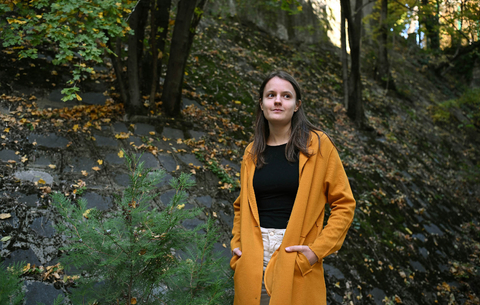The law professor Arpad Erdei
It makes little difference to the work of a Constitutional Court judge which political party nominates him or her, according to Arpad Erdei, the 68-year-old former deputy president of the CC. Though he was nominated by the Right, he believes that it has been two centuries since there was a serious criminal lawyer who was not a liberal on matters legal.
The result of the CC's work is public: we can read its judgements and the judges' dissenting opinions. But we have no idea how decisions are reached. Do the judges vote on a proposal by the presenting judge, or do they argue with each other until a consensus or majority opinion can be found? What happened most recently, when you discussed Fidesz's proposal for a referendum?
I don't want to mention any specific cases, but it has often been the case that a judgement passed by only one vote, and there have been cases where there was not majority, and the president's vote decided the outcome. Cases are handed out according to the judges' fields of expertise and the amount of work they have on at the moment in question. That's how the presenting judge is chosen. The judges discuss his or her draft, and it is common for the decision to be accepted immediately, but the text of the judgement remains up for further debate, if the reasoning behind the judgement needs to be further refined. If there is no agreement at the beginning, then you have to argue until the dividing lines become clearer.
When Laszlo Solyom was president of the Court, many judgements were passed by small majorities, and dissenting opinions had to be released. Janos Nemeth preferred to repeat debates until a consensus or strong majority position could be found. Andras Hollo, and Mihaly Bihari, the current president, are both somewhere in between. They leave enough time for a question to be debated several times, but if it becomes clear that neither side will give way, they call a vote. It's also significant that even the most respected university professors take time to get the hang of work on the Constitutional Court. Istvan Kukorelli once said that judges should wear 'L' plates for a year after being appointed.
And how real is the left-right divide seen from inside? Do judges tend to vote according to the interests of the parties that appointed them?
All CC decisions have political consequences, and you can always look for and sometimes find politics behind the Court's judgements - but this does not mean that the CC is playing politics. It's also true that you can normally guess what a given judge's opinion will be in relation to some of the more important cases, but this is not because he or she is serving the party that appointed him or her, but because you can guess at the principals they adhere to from all their published academic writing. Turning to the dissenting opinions and the consensus votes, then this picture is quite absurd. I have voted both with and against just about every single judge. Janos Nemeth is a friend of mine, and we regularly write dissenting opinions against each others' judgements, while Mihaly Bahari, who is seen as a a left-winger, has several times written opinions jointly with Eva Tersztyanszkyne Vasadi, who is seen as a conservative. As far as my own field is concerned, there have been few important criminal law specialists who were not liberals on matter of legal theory since the first quarter of the 19th century.
Is it true that you upset the Orban government with decisions like that which struck down the 1999 anti-mafia law? Do you still think that law would have created excessive powers for the police?
That wasn't the problem - there were some aspects of the mafia laws that we didn't even examine. That was the first major case that they didn't hand to me because I was a criminal lawyer, but because others were overburdened with work. The basis for the judgement was constitutional law: it was unacceptable in its form, and in some details. You cannot modify a law like the one on policing, which requires a two-thirds majority in parliament, with a simple majority law.
How fixed are Constitutional Court decisions? Do the judges regard the judgements on abortion and euthanasia as fixed and immutable, not to mention the one that ruled the death penalty unconstitutional?
I still think it right that the CC linked the right to life with the right to human dignity, but there is no doubt that it could happen in certain cases that life and dignity come into conflict with each other. This was the case with the euthanasia ruling. I can list extreme, unique instances, but in general, I regard the right to life as very hard to reject. Cases relating to euthanasia or bearing arms can come before the Court again and again - those kinds of decisions are not immutable, set in stone for generations to come. At the same time, I don't anticipate any dramatic changes. It's like a well-founded building. You can change the fascia or one or two bricks, but you don't alter the structure.
As a presenting judge, one of your most controversial decisions related to drugs. You rejected the distinction between soft and hard drugs, and said there were historical reasons for the banning of all addictive drugs other than alcohol, coffee and nicotine. You are a heavy smoker. Were you not doing yourself a favour by drawing such a dramatic distinction between nicotine and cannabis?
No, it was a decision on substance. I had to establish whether the laws in question were in conflict with the constitution or any international treaties. If a law were passed banning nicotine products, then I suspect it would be constitutionally correct.
What if the EU's Court in Luxembourg came up with such a decision? With respect to one of the proposed referendum questions, the CC emphasised that a referendum could provide authority for maintaining the pharmacy monopoly, even if it conflicted with a ruling by the European Court of Justice. Does this mean the EU cannot overrule national Constitutional Courts?
There are aspects of Community law that the CC cannot touch. But there are other areas where the EU only provides a framework for legislation, and it is up to domestic legislation to come up with the precise form for that law. So if there is a conflict with the constitution, the CC can strike down that law, and it is up to the government to find a solution that implements Community legislation without violating national law. When we joined the EU, there was a requirement that we create a law on the storage of agricultural products. The CC had no problem with the aim of the law, but its form was unacceptable, because it had retroactive effect. The government had to get rid of the conflict.
An apparently absurd law will come into force on 1 April. It makes it illegal to wear a bullet-proof vest at any event held on public land. The law describes these jackets as dangerous implements, even though they can clearly only be used for protection. The law is clearly a response to last autumn's rioting. Do you think such rapid legislative responses to current events are acceptable?
You have to look at the content of the law on a case-by-case basis. In general, however, legislating in response to specific cases is a bad idea. "Mrs Tribuszerne's law" is a good example. The court did not order the arrest of a woman who had been sentenced to a lengthy prison term for setting up a pyramid scheme. She disappeared. The legislators' reaction was to make it obligatory for judges to order arrests for more serious charges at the prosecutors' request. This was a serious violation of judicial independence. The law would have made such disappearances more difficult in future, certainly, but by violating the much more important principal of judicial independence. So we declared the law unconstitutional.
GERGELY FAHIDI









